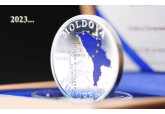
Foreign blood of the Moldovan economy, or Who controls the country's banking sector
Commentary by InfoMarket Agency
There are 10 banks left in Moldova. Although, now few people remember, during the “dawn” of banking activity, there were 17 commercial banks operating in the country simultaneously. This is – at once. In fact, there were much more. But even today, as well as 35 years ago, many experts, especially foreign ones, believe that 3-5 banks would be quite enough for such a small country as Moldova. However, there is another opinion: every market participant has its own client, even in such a financially intensive sector as banking, even if the loan portfolio of a commercial bank (CB) is smaller than that of a non-bank credit organization (NCO). Still, the requirements to the activities of a CB are more stringent than those of an NCO, and it is necessary to comply with them. It is not always necessary for NCOs to become banks.
Governor of the National Bank of Moldova (NBM), Leonid Talmaci, as it is known, was against the rapid entry of foreign banking organizations and institutional investors into the Moldovan market, thus giving time to the Moldovan banking system to get stronger. In this way he wanted to let the local business stand on its feet, to rise in value in order to somehow resist the Western millions. And yet, today, only one commercial bank in Moldova with a market share of about 4% remains completely local, controlled by local business. The other nine commercial banks in the country have long been owned by foreign shareholders and controlled by foreign capital.
If we consider the truth that the banking system is the circulatory system of the economy, foreign blood flows in our economy. Despite all the existing risks in Moldova, our banking system is profitable and in this sense - attractive for investors. And the risks are minimized by the fact that Moldova has joined the Basel III standards - their fulfillment ensures absolute fulfillment by banks of a number of requirements, which provide an almost complete guarantee of safety of investments in the banking sector and their immediate return in case of any force majeure situation.
Therefore, every year questions arise whether the Moldovan banking system earns too much, given the collapse of the economy. The opposition even proposed to increase the tax on the banking sector's profit, but this will not be done for many reasons.
How profitable is the Moldovan banking system? Let's take the last 5 years, while every year was marked by a crisis: pandemic, war, energy crisis, elections, energy crisis again...
Moldova's banking sector profits in 2020-2024
|
Year |
Profit in bln. lei |
|
2020 |
1,50 |
|
2021 |
2,29 |
|
2022 |
3,66 |
|
2023 |
4,09 |
|
2024 |
3,98 |
Despite a slight decrease in total profits in 2024, some banks recorded an increase. The profit of maib amounted to 1.40 billion lei (up 14.4% compared to 2023); Moldindconbank - 1.11 billion lei (up 19.8%). At the same time, Victoriabank's profit amounted to 0.59 billion lei (minus 12.1%); OTP Bank - 0.57 billion lei (minus 27.8%).
Who owns the Moldovan banking system, who makes money from it and who actually controls it.
maib
HEIM Partners Limited - 38.69% stake and 45.55% of voting rights
Natalia Vrabie - 4.99% stake and voting rights
Within the HEIM Partners Limited consortium, the shares are distributed as follows: EBRD - 37.5%; Invalda INVL - 37.5%; Horizon Capital - 25%.
Moldindconbank
Doverie-Invest S.A. (investment fund from Bulgaria) - 77.63% stake
Victoriabank
Banca Transilvania - 66.77% stake
EBRD - 27.56% stake
At the same time, the EBRD is also a shareholder of Banca Transilvania itself - 6.87%.
OTP Bank Moldova
OTP Bank Nyrt. (international banking group from Hungary) - 98.26% stake
Procredit Bank Moldova
ProCredit Holding AG & Co. KgaA (Germany) - 100% stake
Eximbank
Intesa Sanpaolo (international banking group from Italy) - 100% stake
Fincombank
Main shareholders, citizens of Moldova: Dorin Nicolae - 20.63%; Hvorostovschi Victor - 9.65%; three other individuals - 5.97%; company Continent SRL - 9.84%; company Agro Nova Prim SRL - 9.10% stake.
Energbank
Iute Group AS (Estonia) - 95.92% stake
Comertbank
ACF Corporate Finance Consulting AG (Austria) - 99.9% stake
The company is owned by two individuals with UK and Israeli citizenship.
Eurocreditbank
Zisi Mariana (Greece) - 46.45%; four other individual shareholders from Greece - 9.37%; Mahmood Mohammed Shakir Mahmood (UAE) - 42.19% stake.
Market share of commercial banks in Moldova by asset size
|
|
Assets as of January 31, 2025, in mln. lei |
Market share by asset size, in %
|
|
Comertbank |
2208.7 |
1.29 |
|
Energbank |
3350.0 |
1.97 |
|
Eurocreditbank |
1687.3 |
0.99 |
|
Eximbank |
5726.9 |
3.36 |
|
Fincombank |
6089.4 |
3.57 |
|
maib |
61373.3 |
35.98 |
|
Moldindconbank |
35809.7 |
20.99 |
|
OTP Bank |
20525.0 |
12.03 |
|
ProCredit Bank |
7383.6 |
4.33 |
|
Victoriabank, (BCR Chisinau) |
24432.7 1981.3 |
15.49 |
|
TOTAL |
170576.9 |
100 |
Thus, of the largest foreign investors, the Bulgarian holding Doverie controls 21% of the Moldovan banking market; and the Central and Eastern European banking group from Hungary, OTP, controls 12%. Still, the European Bank for Reconstruction and Development has absolute control over the Moldovan banking system. By the way, it is a commercial bank, i.e. according to its charter it should earn profit.
The EBRD directly controls 51.47% of the Moldovan banking market (maib and Victoriabank). But in reality, the EBRD's influence on the country's banking market is much deeper. In 2007, the EBRD invested EUR 3.3 million for 10% of Mobiasbanca's (now OTP Bank) capital. This late 2007 project was shelved but is now operational. The EBRD also issued EUR 20 million in guarantees to maib in September 2024 to cover 50% of loans to SMEs. The same guarantees, but for EUR 15 million in September 2024, were issued to OTP Bank Moldova. Procredit Bank received EUR 10 million from the EBRD in July 2024 under the SME Competitiveness Programme in Eastern Partnership (EaP). These are just some of the EBRD's existing projects in the Moldovan banking sector.
The first law of the investor is: protect your investment. Therefore, when an investor, in this case the EBRD, invests tens of millions in a commercial bank, it necessarily stipulates the conditions for protecting its capital by directly or indirectly influencing the borrower's activity under the threat of sudden withdrawal of its loans, investments, possibly punitive sanctions, etc.
When Moldova gained independence, there were five banks operating in the country: Vneshtorgbank/Внешторгбанк (its successor became Eximbank), Savings Bank (Banca de Ecomonii), Promstroibank/Промстройбанк (Moldindconbank), Zhilsotsbank/Жилсоцбанк (Banca Sociala), Agroprombank/Агропромбанк (which became Moldova-Agroindbank and subsequently maib). There were also several first commercial banks in Moldova, of which only Victoriabank is currently operating. Of course, there was still a representative office of the USSR Gosbank/ Госбанк, which was responsible, among other things, for money issue, but these functions were taken over by the new regulator - the National Bank of Moldova. And it, unlike the others, is not a commercial financial institution.
As it was already mentioned, the number of commercial banks in the country at one time was up to 17. Today, there are 10 of them. The list of banks that operated on the Moldovan market, but left it for various reasons, was supplemented this year by BCR Chisinau. Here is, perhaps, the whole list of those who ever had a banking license and lost it, in alphabetical order.
Commercial banks of Moldova that have ceased operations
|
Banca de Economii |
Basarabia |
International Commercial Bank (Moldova) |
|
Banca Internațională de Investiții și Dezvoltare Moldo-Bulgară (BIID MB) |
BCR Chișinău |
Întreprinzbancă |
|
Banca Municipala Chișinău |
Bucuriabank |
Investprivatbank |
|
Banca Sociala |
Businessbanca |
Oguzbank |
|
Banca Turco-Română (BTR) Moldova |
Capital Bank |
Unibank |
|
Bancosind |
Guinea |
Universalbank |
|
|
|
Vias |
Some interesting facts about Moldova’s banking sector.
1. Basarabia bank is the first commercial bank to have its license revoked (1996).
2. Intreprinzbanca - the first commercial bank, whose closure led to the first protests by defrauded depositors (1997).
3. Guinea is a bank that grew out of a foreign exchange office (1995, license revoked in 1996).
4. Businessbank - PetrolBank (today Eurocreditbank) - the first bank merger that failed. Led to the bankruptcy of the first and rebranding of the second. (2001).
5. Eurocreditbank - first complete rebranding and renaming of the bank from Petrolbank (2002).
6. Mobiasbanca is the first bank in Moldova to be bought by an international financial group (Societte Generale) (2007).
7. Procredit Bank is a bank that grew out of a non-banking credit organization formerly called MEC Moldova (Micro Enterprise Credit) (2008)
8. Investprivatbank - after the revocation of the license in 2009, all deposits to individuals were returned under state management.
9. “The Billion Theft”, revocation of licenses of Banca de Economii, Banca Sociala, Unibank (2015).
10. BCR Chisinau - first successful takeover on the market, by Victoriabank (2025).
Moldovan legislation does not allow foreign banks (organizations) to open branches or representative offices in the country: if they want to be present on our market, they must open a full-fledged commercial bank with all financial and legal requirements. This clause does not always suit foreign investors, but it has helped to maintain the stability of the Moldovan banking system in times of crisis. For example, when the Italian group Venetto, which owned the Moldovan Eximbank, went bankrupt, it could not drag it down with it, because Eximbank was an asset abroad, absolutely independent from the group's finances, and a profitable asset. As a result, this asset was sold to the Italian group Intenso and continues to bring profit to the new shareholder.
In Moldova there are no restrictions on the presence of foreign capital in the banking system. Therefore, the National Bank of Moldova is the only guarantor of the protection of the country's financial sovereignty. Therefore, our state sovereignty depends on the country's ability to regulate the financial sector, guided solely by the interests of the country. And this is just one of the reasons why the regulator - the National Bank of Moldova - must be a truly politically and financially independent institution. It must exist for the protection of Moldova's state sovereignty. // 06.03.2025 - InfoMarket.







